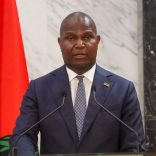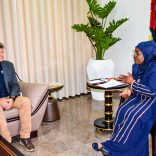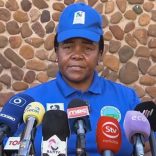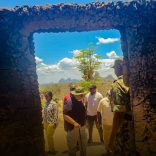Mozambique: Teachers to receive full overtime pay – President
Mozambican Bar Association says CNE/STAE “sent message that crime pays” – CIP Mozambique Elections

“Mozambicans completely distrust the electoral administration [and] this lack of confidence is borne out by the excessively large number of irregularities during the election, which were pointed out by the District Courts. This sends a message that crime and manipulation pay in Moçambique”, states the Mozambican Bar Association (Ordem dos Advogados, OAM), in a statement published Friday (27 October).
According to the Bar Association, the electoral process under way is “poisoned by serious vices which raise serious and well-grounded doubts about the freedom and justice of this process and the results announced”.
The OAM points to the compete disbelief among Mozambicans in the electoral administration bodies, notably the CNE and STAE, and says the same is happening with the district law courts, as electoral courts in the first instance during elections, and the Constitutional Council. A spill-over effect is leading to a “lack of trust in their impartiality and legitimacy, equilibrium and independence” of the executive and legislative powers and the political parties.
In this very hard-hitting statement, the OAM say that the irregularities that occurred in these elections were admitted, on 26 October, by CNE head Bishop Carlos Matsinhe, when, at the same time as he announced the results of the 11 October elections, he said “they will be investigations”.
“It is extremely irresponsible, to say the least, for a quasi-jurisdictional institution, such as the CNE, to remain silent for many long nights, and then, with perhaps with little useful effect, to announce investigations which, right from the start, are extemporaneous”, writes the OAM. “If there is a moment when institutions are discredited, it is during elections, because impunity tends to become installed before the gaze of the relevant institutions, such as the Public Prosecutor’s Office, which is in charge of prosecutions, guarantees legality, and even possesses powers to act officially when the public interest is at stake”.
The Bar Association still has a vestige of hope that the Constitutional Council can rescue justice and the rule of law. “We hope that the Constitutional Council will defend the democratic rule of law, and does not open another front in the attack against our young constitutional order”.
Finally, the OAM hits at the unnecessary rigidity of the district courts. Justice must not “succumb to formalisms that are foreign to the Electoral Law in particular, and to legal procedure, in general”
- HRW: “Security forces are set to silence opposition voices”
“Mozambican security forces have used excessive force, including live ammunition, rubber bullets, and tear gas, against largely peaceful protesters following local elections,” Human Rights Watch said on (Friday 27 Oct.
In Maputo police with five armoured vehicles stopped a Renamo march on Av 24 de Julho yesterday and ordered protesters to disperse. But without waiting and without warning, they fired tear gas into the crowd and fired guns into the air. “Police also used excessive force in the northern province of Nampula, including live ammunition, rubber bullets, and tear gas against demonstrators in Nampula and Nacala Port,” HRW said.
“The post-election violence in Mozambique shows that the security forces are set to silence opposition voices rather than to exercise restraint,” Budoo-Scholtz said. “Mozambique’s regional and international partners should meaningfully press for accountability for these abuses so that the government will prevent future violations.”
- So far, mild response from international partners
But unlike HRW and Mozambican lawyers, the response from international partners so far is watch, wait, and trust government institutions. The European Union on Saturday “notes with concern reports of irregularities and trusts they will be adequately addressed to ensure a peaceful and satisfactory outcome of the electoral process, in full respect for the rule of law and democratic principles.” The EU also “calls on all parts involved to act in a peaceful manner and on the authorities to ensure the safe exercise of the right of freedom of association and expression.”
The UK on Friday issued a statement saying it “regrets” the violence and “notes the allegations that serious irregularities have characterised the electoral process.” In response, “we acknowledge the independence of Mozambique’s judicial authorities in resolving electoral complains and disputes, upholding the rule of law and supporting Mozambique’s commitment to credible and peaceful elections.”
Canada, Norway and Switzerland on 23 October “voiced concern about reported election irregularities. … We call on all parties to work through the appropriate complaints process within the Mozambican legal system to ensure confidence in the integrity of the democratic process and to address reports of irregularities in accordance with Mozambican law.”
The all three statements stress trust of the Mozambican legal system, at a time when Mozambique’s own bar association is highly critical of that system. There is a danger that the Frelimo government will take the very mild statements as continued support.
- Calm Saturday after a black Friday
Nacala, Nampula and Maputo cities woke to a calm Saturday today after a Friday of violence in which six deaths and dozens of injuries were reported during the demonstrations called by Renamo in the three cities to protest against the election results.
Four deaths were in Nampula and two in Nacala, one of whom was a child; 14 people suffered bullet wounds in Nacala, and nine in Nampula. Some of the injuries are serious. One minor was struck by four bullets and is in a serious condition. One of the bullets crossed his abdominal cavity. Some of the injured will need to have arms amputated.
Sixty people were arrested in Nampula, and 10 elsewhere, said the spokesperson for the General Command of the police, Orlando Mudumane. Four people were arrested in Maputo, four in Nacala and two in Quelimane.
In Maputo, there were some injuries.
There were also demonstrations in Quelimane, Guruè and Alto Molócuè, in Zambézia province; and in Mozambique Island and Angoche, in Nampula.
- Train blocked and market stall burned
In Nampula, the railway line was blocked and the train paralysed. The protesters’ idea was to block all the entrances to the city of Nampula. On National Road Number 1, barricades were put up and tyres were burnt to stop cars coming from the districts of Erati, Nacala, Meconta, Mossuril, etc., and those coming from Cabo Delgado. The airport roundabout was also blocked to prevent travellers from other provinces from entering.
In the populous Namicopo neighbourhood, the police fired tear gas, which ended up setting fire to venders stalls and to a power pole belonging to Electricidade de Moçambique. After a lot of work, the residents put out the fire that threatened to consume some neighbouring homes.
- Protesters block main roads and destroy power pylon in Vilankulo
In the municipality of Vilankulo, a group of supposed protesters burned tyres and blocked the main access roads, especially National Road 240, which leads to the town. Renamo is distancing itself from the demonstration.
The protesters destroyed a high-voltage pylon, which affected 200 families and caused 600,000 meticais in damage to the company Electricidade de Moçambique.
The demonstration began at around midnight on Friday, the same time that Renamo had planned a march, but which was cancelled by its leader and other party members..












Leave a Reply
Be the First to Comment!
You must be logged in to post a comment.
You must be logged in to post a comment.